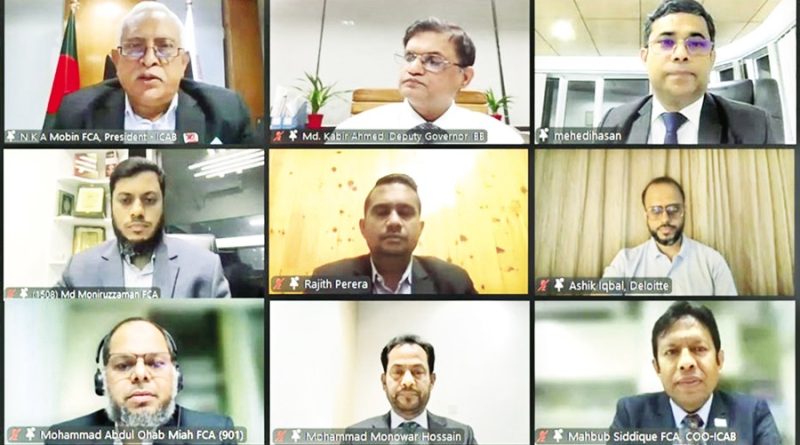Accounting professionals have urged the effective implementation of International Financial Reporting Standard (IFRS) 9 to restore public confidence and improve transparency in Bangladesh’s banking sector.
At a webinar organised by the Institute of Chartered Accountants of Bangladesh (ICAB) on Tuesday, experts said full adoption of IFRS 9 requires robust data systems, sound modelling, and better coordination between risk and finance teams to align with global reporting practices.
They stressed that investment in technology, governance, and data infrastructure would not only ensure compliance but also strengthen banks’ overall financial resilience.
The event, titled “Implementing IFRS 9: Global Insights and Bangladesh Perspectives,” featured Dr. Md Kabir Ahmed, Deputy Governor of Bangladesh Bank, as chief guest. Muhammad Mehedi Hasan, ICAB Vice President and Partner at Rahman Rahman Huq Chartered Accountants, presided over the session.
Challenges in adoption
Experts identified key barriers slowing down the rollout of IFRS 9, including a lack of empirical and recovery data, weak predictive models, and limited forward-looking information.
They noted that the weak correlation between macroeconomic indicators and default rates in Bangladesh has made Expected Credit Loss (ECL) modelling less reliable.
Dr. Kabir Ahmed described IFRS 9 as a “paradigm shift” for an emerging economy like Bangladesh.
“It enables financial institutions to prepare better for potential future losses and become more resilient to economic shocks,” he said, reaffirming Bangladesh Bank’s commitment to work with ICAB to strengthen transparency in financial reporting.
Restoring confidence and discipline
ICAB President N K A Mobin said adopting IFRS 9 is more than a technical compliance task — it is essential to improving governance, ensuring financial stability, and attracting international investor confidence.
“As the leading professional accountancy body, ICAB considers it a duty to build capacity and facilitate a smooth transition to these global benchmarks,” he said.
He also called for joint efforts among key regulators — including Bangladesh Bank, the Bangladesh Securities and Exchange Commission (BSEC), and the Financial Reporting Council (FRC) — to ensure consistent implementation.
International perspective
Rajith Perera, Partner at Ernst & Young and Risk Management Leader at the Institute of Chartered Accountants of Sri Lanka, shared lessons from regional implementation, noting that many banks lacked strong models for calculating Probability of Default (PD) and Loss Given Default (LGD).
“In some cases, banks had no models at all, forcing them to develop methodologies from scratch,” he said.
Sk. Ashik Iqbal, Partner at Nurul Faruk Hasan & Co., said the introduction of IFRS 9 in Bangladesh comes amid high non-performing loans, thin capital buffers, and fragile confidence.
“For many banks, the shift from the old incurred loss model to the ECL framework is not just a compliance issue — it’s a survival test,” he observed.
Path forward
To overcome current challenges, experts recommended a multi-dimensional strategy:
- investing in modern technology for automation and real-time reporting,
- strengthening data governance and risk oversight,
- improving portfolio segmentation to reflect risk profiles, and
- building internal capacity for model validation and scenario analysis.
Mohammad Abdul Ohab Miah of BRAC Bank and Mohammad Monowar Hossain of Standard Chartered Bank also spoke at the event.






